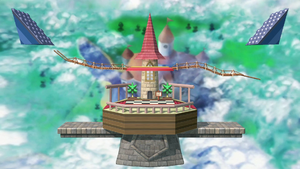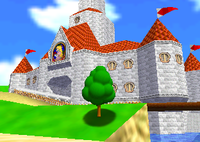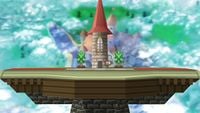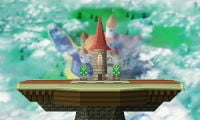Peach's Castle: Difference between revisions
mNo edit summary |
m (→Trivia) |
||
| Line 63: | Line 63: | ||
*Even though the bumper was updated in ''[[Super Smash Bros. 4]]'', the original design and animation is retained in this stage. | *Even though the bumper was updated in ''[[Super Smash Bros. 4]]'', the original design and animation is retained in this stage. | ||
*Unlike other Omega stages, characters face left instead of right on the revival platform. | *Unlike other Omega stages, characters face left instead of right on the revival platform. | ||
*[[Lakitu]] | *[[Lakitu]] occasionally appears in the background of this stage in ''Smash 64'', but not in ''Smash 4''. | ||
{{SSBStages}} | {{SSBStages}} | ||
Revision as of 10:58, August 21, 2018
| Peach's Castle | |
|---|---|
 Peach's Castle in Super Smash Bros. Ultimate. 
| |
| Universe | Mario |
| Appears in | SSB SSB4 Ultimate |
| Availability | Starter (SSB and Ultimate) Downloadable (SSB4) |
| Crate type | Normal |
| Maximum players | 8 |
| Tracks available | In SSB: Track #5 In SSB4: 3DS version: Peach's Castle Stage Main Theme (Super Mario 64) (Alternate) Wii U version: Peach's Castle Stage Main Theme (Super Mario 64) Slide Ground Theme (Super Mario Bros. 3) Ground Theme (Super Mario Bros. 2) |
| Article on Super Mario Wiki | Princess Peach's Castle |
| “ | A bumper floats above the center of this stage. Watch where you jump, or you'll get bumped sky-high! | ” |
| —Super Smash Bros's instruction manual | ||
Peach's Castle (ピーチ城上空, Above Peach Castle) from Super Mario 64 is Mario & Luigi's home stage in Super Smash Bros. In 1P Game, the player fights a team consisting of Mario and Luigi on this stage.
Even though this stage does not appear in Super Smash Bros. Melee, a portion of the music that plays on it plays during the cutscene where Luigi takes Mario's place in Melee's Adventure Mode.
Peach's Castle returned as downloadable content in both versions Super Smash Bros. 4 on July 31st, 2015, alongside Hyrule Castle. Like other returning stages from the first Smash game, some of the textures are slightly higher in quality, but the general overall primitive look of the original is retained. Peach's Castle also returns as a familar stage in Super Smash Bros. Ultimate.
Layout
Peach's Castle has two main platforms, one on top of another. It is possible to fall through the top platform. The bottom platform partially makes a block going left to right, that makes sound in Smash 4 if listened to carefully. On the top two corners there are two floating, inward-angled platforms that move slowly up and down and prevent people from being smashed away too easily. These platforms are very easy to DI off of as well. It has a floating Bumper on the middle above the second platform of the stage. This bumper moves slightly left and right (it remains stationary on 1P Mode though). It is difficult for most characters to recover on this stage since the two floating platforms limit recovery to the top platform and there are no ledges that can be grabbed, with the moving black platform on the bottom of the stage greatly aiding recovery, but it isn't always on the side the player is on). In Smash 4 however, fighters can now grab onto the bottom platforms.
Ω form
The Ω form removes all features but the main platform, which has been extended.
In competitive play
In Smash 64, for a long period according to the old American ruleset, Peach's Castle was usually considered a counterpick stage in singles. This is because of the inability to grab the edges, meaning that some characters can be gimped or edgeguarded much easier than usual, and because of the Bumper hazard and angled platforms on the side of the stage that can prevent KO moves that would have otherwise KO'd. However, the Bumper can be used for various unique combos, and can also be used by characters such as Pikachu to escape pressure. The stage is often counterpicked by Jigglypuff and Kirby players, and the lack of edges that can be grabbed serves as a disadvantage to characters such as Link and Captain Falcon. However, most recently the stage was banned. In doubles tournaments, the stage is usually banned, due to the listed reasons above along with the fact that the stage is too small.
In the Japanese ruleset, the stage is always banned in all formats as is every other stage except for Dream Land, due to the reasons mentioned above.
Origin

This stage is loosely based on various elements of Princess Peach's Castle from Super Mario 64, along with other elements from the game, such as: the bridges resemble the broken bridges that are in Cool, Cool, Mountain; and the design of the triangular-pyramidal platforms seen on the upper sides resemble platforms that have a similar circle pattern design, such as the starting platform of Bowser in the Dark World. Princess Peach's Castle can also be seen in the background, as well as, occasionally, Lakitu; however, Lakitu does not appear in SSB4.
Gallery
Peach's Castle in Super Smash Bros. for Nintendo 3DS.
Peach's Castle in Super Smash Bros. for Wii U
Trivia
- In early screenshots of the stage select screen of the original Super Smash Bros., this stage went by the name "In the Sky of Castle Peach".
- One of Peach's Castle's hazards is a bumper, which is mostly used as an item. Coincidentally, this is the first stage to use an item as a hazard, and have a hazard outside of its own universe; Peach's Castle is from Mario and the Bumper is from Super Smash Bros.
- Even though the bumper was updated in Super Smash Bros. 4, the original design and animation is retained in this stage.
- Unlike other Omega stages, characters face left instead of right on the revival platform.
- Lakitu occasionally appears in the background of this stage in Smash 64, but not in Smash 4.
| Stages in Super Smash Bros. | |
|---|---|
| Starter stages | Congo Jungle · Dream Land · Hyrule Castle · Peach's Castle · Planet Zebes · Saffron City · Sector Z · Yoshi's Island |
| Unlockable stage | Mushroom Kingdom |






